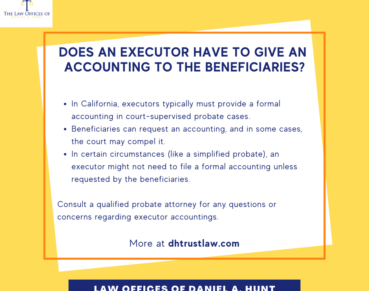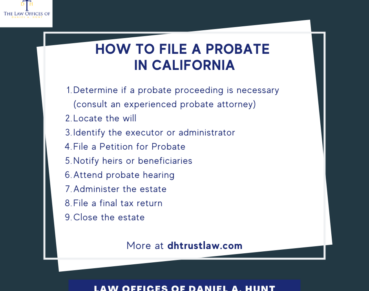How to Handle Creditors in Probate

If you’re the Personal Representative of the estate in a probate matter, you should know that death does not automatically eliminate the decedent’s debts. If you want to understand how to handle creditors in probate, you must learn how to properly notice creditors, respond to creditor claims, and negotiate with creditors.
Common Estate Creditors
Common estate creditors include the US government (the California Franchise Tax Board, the IRS, and the California Department of Health Services) and both secured and unsecured debt.
Secured debts are attached to collateral which the lender can seize, sell, and use to pay back the debt if the borrower defaults on payments. Real estate mortgages and car loans are examples of secured debt.
Unsecured debt lacks collateral, like credit card debt and student loan debt. Unsecured debt is a lower priority creditor in an estate administration.
Which Debts Take Priority in Probate?
The Personal Representative must pay off estate debts in a specific order under California Probate Code Section 11420. This statute lays out the order in which estate debts must be paid:
- All expenses related to the estate administration.
- Obligations secured by a mortgage, deed of trust, or another lien.
- Funeral expenses.
- Medical expenses related to last illness or death.
- Family allowance (for family members who relied on the decedent for support).
- Wage claims (unpaid wages to any employees).
- All other debts, including unsecured debts.
How to Send Notice to Estate Creditors
The Personal Representative has a duty to notify any “known or reasonably ascertainable creditors of the decedent” concerning the decedent’s death. Here is a sample of the format this notice should take.
Probate Code 9053 explains, “A personal representative has a duty to make reasonably diligent efforts to identify reasonably ascertainable creditors of the decedent.” However, you will not be held liable for failing to notice estate creditors unless you do so “in bad faith” (intentionally) and the creditor complies with a number of steps outlined in the above Probate Code section.
Requirements for Creditors to Make a Claim
Under Probate Code Section 9100, creditors must file a claim either:
- Within 4 months of the Personal Representative receiving Letters of Administration from the court; or
- Within 60 days of the creditor receiving a notice of administration from the Personal Representative.
In order for their claim to be valid, the creditor must file the claim with the Court and serve a copy of the claim on the Personal Representative with the relevant written instrument attached, per Probate Code section 9150.
How to Respond to Creditor Claims
The Personal Representative must respond to all claims in writing. You can allow or reject the claim in whole or in part. You must file the allowance or rejection (form DE-174) with the court clerk and send a notice to the creditor with a copy of the allowance or rejection.
Note that if the Personal Representative does not have powers under the Independent Administration of Estates Act (IAEA), the court will have to approve or reject creditor claims. This is also true if the Personal Representative or their attorney is a creditor of the decedent.
Probate Code Section 9254 holds that a rejection can be contested, but the burden of proof falls to the contestant. The exception is if the Personal Representative acted under the IAEA to reject the claim, in which case the burden of proof falls to you.
How to Negotiate with Estate Creditors
If the estate has funds to pay the debts and creditors have filed a claim, you may wish to negotiate the debts to preserve the maximum amount for the heirs or beneficiaries. The first step to negotiating with creditors is to verify that the debt is authentic. Not all apparent debts are equally valid. Confirm that the supposed claim wasn’t previously paid by the decedent before their death. Sometimes companies don’t keep perfectly accurate records. Fraud does happen occasionally when false claims are made, so be careful to ensure that all claims are accurate.
Next, prepare a settlement offer, which is the maximum amount the estate can afford to pay the creditor. Contact the creditor and present the settlement offer as Personal Representative of the estate. Once you reach an agreement, request the settlement offer in writing.
Once received, send the payment via certified mail along with a copy of the written agreement. Remember to request a return receipt so you have proof of delivery. Keep a copy of the payment and settlement for your records in case the creditor or a collection agency claims the debt was never paid.
Insolvent Estates
If the estate’s debts are greater than its assets, it is said to be “ insolvent”. If insolvent, not all debtors are going to be paid back in full. Where an estate is insolvent that court requires that all creditors who have filed a valid claim will get paid under a pro-rata division of the estate assets.
There are many factors to consider when handling creditors in a probate matter. If you’re the Personal Representative of an estate with significant debts, you may wish to consider hiring an experienced probate lawyer. They can help you observe all deadlines, meet the legal requirements under the Probate Code, and negotiate with creditors. If you need help handling creditors in a probate, feel free to contact our office.
Law Offices of Daniel A. Hunt
The Law Offices of Daniel A. Hunt is a California law firm specializing in Estate Planning; Trust Administration & Litigation; Probate; and Conservatorships. We've helped over 10,000 clients find peace of mind. We serve clients throughout the greater Sacramento region and the state of California.




